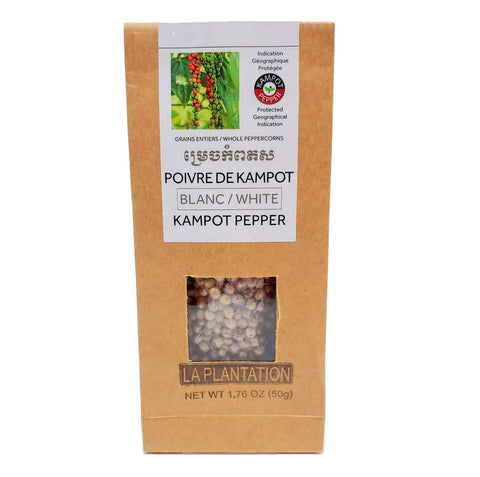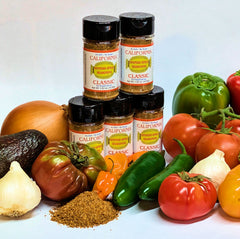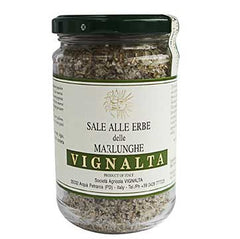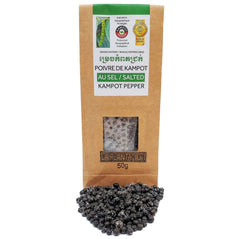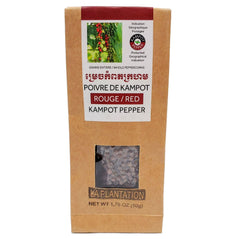Kampot White Peppercorns 50g
In 2011, Corti Brothers first offered KAMPOT Pepper from the kingdom of Cambodia. Kampot pepper was famous in France during the almost 87 year period when Cambodia, Laos and Vietnam were part of French Indochina. Known by the Chinese since the 13th century, Kampot pepper comes from the vine of the species Piper nigrum, which produces all of what we call “pepper,” the little grain that also gives its name to a monetary term.
Kampot is a province in the southern part of the country, just south of the capital Phnom Penh. It is the first Cambodian product to be given a PGI or Protected Geographical Indication in 2009 by the national government and the European Union. This means that the pepper vines must be grown within its designated area in Kampot and Kep province, following traditional methods. Kampot was the source of most pepper in France from 1863 to 1953, when the country declared independence. In the 1970s, the country became to site of political devastation and the pepper vines were left to die. They are very sensitive and require careful attention. The same fruit of the pepper vine produces a series of peppercorns. Remember peppercorn rent?
From the same “fruit of the vine”a relatively new producer, La Plantation, owned by a Franco-Belgian couple, produces the traditional black peppercorns; white pepper corns, which are black pepper with the skin removed; the very special and slightly different charactered “red” peppercorns, which are the ripe pepper berries picked when red colored and ripe and a very special type of green pepper corns, which are fermented and salted. These latter two are remarkable!
Together with the Red Kampot pepper, the salted green peppercorns is something no kitchen should be without. Rare and delicious, they are both truly exceptional.
The Kampot Red is to be ground in a mill just like white or black pepper is. The Salted Green is to used whole, as is, in place of ground pepper. Put into sauces, braises, even salads, they act as pepper but with a very special character: they pop in your mouth much like first rate caviar berries do, but these have a magical piperine flavor which hits your palate with an almost mentholated burst and is both surprising and delicious. The peppercorns themselves seem hollow. When wine is drunk after a hit of these peppercorns, you mouth comes alive. Now I can see why Lord Byron used to sprinkle cayenne pepper on his tongue before drinking claret. But the sensation with the salted peppercorns is even more delicious.
Kampot is a province in the southern part of the country, just south of the capital Phnom Penh. It is the first Cambodian product to be given a PGI or Protected Geographical Indication in 2009 by the national government and the European Union. This means that the pepper vines must be grown within its designated area in Kampot and Kep province, following traditional methods. Kampot was the source of most pepper in France from 1863 to 1953, when the country declared independence. In the 1970s, the country became to site of political devastation and the pepper vines were left to die. They are very sensitive and require careful attention. The same fruit of the pepper vine produces a series of peppercorns. Remember peppercorn rent?
From the same “fruit of the vine”a relatively new producer, La Plantation, owned by a Franco-Belgian couple, produces the traditional black peppercorns; white pepper corns, which are black pepper with the skin removed; the very special and slightly different charactered “red” peppercorns, which are the ripe pepper berries picked when red colored and ripe and a very special type of green pepper corns, which are fermented and salted. These latter two are remarkable!
Together with the Red Kampot pepper, the salted green peppercorns is something no kitchen should be without. Rare and delicious, they are both truly exceptional.
The Kampot Red is to be ground in a mill just like white or black pepper is. The Salted Green is to used whole, as is, in place of ground pepper. Put into sauces, braises, even salads, they act as pepper but with a very special character: they pop in your mouth much like first rate caviar berries do, but these have a magical piperine flavor which hits your palate with an almost mentholated burst and is both surprising and delicious. The peppercorns themselves seem hollow. When wine is drunk after a hit of these peppercorns, you mouth comes alive. Now I can see why Lord Byron used to sprinkle cayenne pepper on his tongue before drinking claret. But the sensation with the salted peppercorns is even more delicious.


